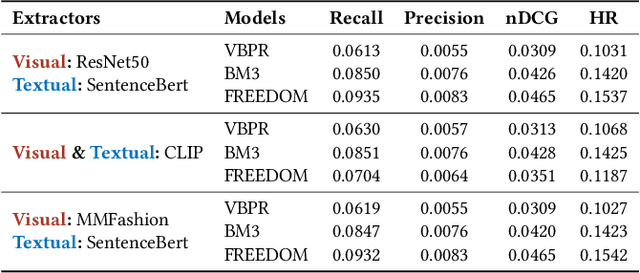Giuseppe Gassi
Ducho 2.0: Towards a More Up-to-Date Feature Extraction and Processing Framework for Multimodal Recommendation
Mar 07, 2024

Abstract:In this work, we introduce Ducho 2.0, the latest stable version of our framework. Differently from Ducho, Ducho 2.0 offers a more personalized user experience with the definition and import of custom extraction models fine-tuned on specific tasks and datasets. Moreover, the new version is capable of extracting and processing features through multimodal-by-design large models. Notably, all these new features are supported by optimized data loading and storing to the local memory. To showcase the capabilities of Ducho 2.0, we demonstrate a complete multimodal recommendation pipeline, from the extraction/processing to the final recommendation. The idea is to provide practitioners and experienced scholars with a ready-to-use tool that, put on top of any multimodal recommendation framework, may permit them to run extensive benchmarking analyses. All materials are accessible at: \url{https://github.com/sisinflab/Ducho}.
Ducho: A Unified Framework for the Extraction of Multimodal Features in Recommendation
Jun 29, 2023Abstract:In multimodal-aware recommendation, the extraction of meaningful multimodal features is at the basis of high-quality recommendations. Generally, each recommendation framework implements its multimodal extraction procedures with specific strategies and tools. This is limiting for two reasons: (i) different extraction strategies do not ease the interdependence among multimodal recommendation frameworks; thus, they cannot be efficiently and fairly compared; (ii) given the large plethora of pre-trained deep learning models made available by different open source tools, model designers do not have access to shared interfaces to extract features. Motivated by the outlined aspects, we propose Ducho, a unified framework for the extraction of multimodal features in recommendation. By integrating three widely-adopted deep learning libraries as backends, namely, TensorFlow, PyTorch, and Transformers, we provide a shared interface to extract and process features where each backend's specific methods are abstracted to the end user. Noteworthy, the extraction pipeline is easily configurable with a YAML-based file where the user can specify, for each modality, the list of models (and their specific backends/parameters) to perform the extraction. Finally, to make Ducho accessible to the community, we build a public Docker image equipped with a ready-to-use CUDA environment and propose three demos to test its functionalities for different scenarios and tasks. The GitHub repository and the documentation is accessible at this link: https://github.com/sisinflab/Ducho.
 Add to Chrome
Add to Chrome Add to Firefox
Add to Firefox Add to Edge
Add to Edge